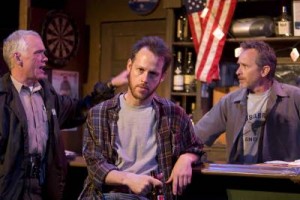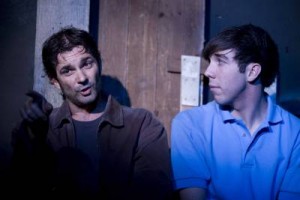
Five years ago, Grace Tisdale, a young Midwestern deputy sheriff and Mark Shawver, a teenage bagger, were gunned down in a grocery store robbery, precisely the kind of crime big city dwellers read about on a daily basis. To the residents of this small American town, however, it was not merely the deputy and the teenager who were victimized. Grace Tisdale left behind a husband and a brother, both of whose lives were forever changed.
Thus begins American Dead, a new play by Brett Neveu and the second production of Rogue Machine, one of L.A.’s most promising new theater companies. The title refers not only to the two crime victims, but to the dying town itself. The school, the bank, the gas station—they’ve all closed, though the doors of the local bar remain open.
In the years since the crime, Grace’s widower has remarried, but her brother Lewie, already not the brightest bulb in the chandelier, remains traumatized by the crime and keeps reliving the robbery, visited by the imagined ghosts of Grace and Mark.
Now, Lewie’s life is about to be changed by two unconnected events. First, Grace’s husband Doug and his second wife Lisa are about to move away, and in so doing, rob Lewie of the one remaining link to his murdered sister. Secondly, a stranger from another town has begun to frequent the bar where Lewie is habitually served one drink too many, a stranger with a secret.
The stranger is a man named Dennis Rescola, known in these parts as the father of “that kid who wouldn’t leave his house for a few days because he didn’t want to go to school,” that kid who “had some guns.” Dennis has a reason for showing up in Bill Doane’s bar, one which will rock Lewie’s already unstable world.
Playwright Neveu has had considerable success in Chicago, where Jack Helbig of the Daily Herald wrote, “the day is probably going to come when we lose Brett Neveu, when this talented playwright lights out for greener pastures on either the East or West Coast.” The talented writer is now L.A. based, and Rogue Machine is fortunate indeed to have American Dead as their sophomore effort.
Neveu’s writing captures the Midwestern idiom, his serious subject matter spiced with dashes of wry humor. Dennis earns his living making polyethylene belts for vacuum cleaners and washing machines, but he’s “sworn to secrecy” about how exactly they’re made. Bill is none too happy to hear his bar described as smelling “like an ass crack.” There’s also a running gag about how many drinks Bill is allowed to serve Lewie under Sheriff Alan Starett’s eagle eye.
Under the outstanding direction of Dado (that’s her whole name), the entire cast of American Dead deliver sterling performances. Mark St. Amant creates a fascinatingly enigmatic Lewie, a not terribly bright man unable to exorcise the ghosts of his murdered sister and the stranger who was killed with her. Paul Dillon is brilliant as Sheriff Starett, folksy yet steely, and Darin Singleton is equally fine as mystery man Rescola. Dillon and Singleton have the play’s most powerful scene, an interrogation between a fierce police officer and a troubled father who becomes a broken man before our eyes.
Bradley Fisher is excellent as bartender Bill, waiting in vain for “the town to get its second wind.” David Paluck does compelling work as Doug, who feels bad about leaving Lewie behind but knows that this town is no longer the place for him or for his schoolteacher wife, the always striking Ann Noble. Recent LA Weekly Award-winner Deborah Puette is heartbreaking as murdered Grace, and Matthew Scott Montgomery is boyish sweetness as Mark, who happened to be in the wrong place at the wrong time.
American Dead’s impact is heightened by an absolutely superb design team. Scenic designer Ian Garrett fills Theatre-Theater’s cavernous black box with a multilevel set which vividly depicts a town on the verge of becoming a ghost town. Leigh Allen’s lighting is equally arresting, clearly differentiating between the real and the imaginary, the red traffic light suspended above the set punctuating scenes and symbolizing the go-nowhere town where American Dead is set. Bob Rokos has created an outstanding (and appropriately moody) sound design, and Stephanie Kerley Schwartz’s costumes couldn’t be more right for the play’s characters.
Neveu’s script does take a while to get going, and at least in this instance I would have benefited from having read the kind of introductory synopsis which begins this review. Also, the play’s abrupt ending proved confusing, both to myself and to the friend who was my guest, provoking a “What?” at blackout rather than a “Wow!” Once a couple of cast members gave me their take on the ending, it all made sense, but I wish I hadn’t had to ask.
Overall, however, American Dead is well worth seeing. It is gritty, suspenseful, and often grimly funny in both its writing and its acting, and makes one eager to see what’s next for Rogue Machine.
Theatre Theater, 5041 Pico Boulevard, Los Angeles.
www.roguemachinetheatre.com
–Steven Stanley
July 25, 2008
Photos: John Flynn




 Since 2007, Steven Stanley's StageSceneLA.com has spotlighted the best in Southern California theater via reviews, interviews, and its annual StageSceneLA Scenies.
Since 2007, Steven Stanley's StageSceneLA.com has spotlighted the best in Southern California theater via reviews, interviews, and its annual StageSceneLA Scenies.







 COPYRIGHT 2024 STEVEN STANLEY :: DESIGN BY
COPYRIGHT 2024 STEVEN STANLEY :: DESIGN BY